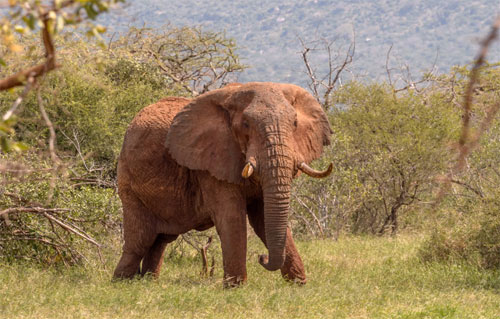March - April 2021 Animal Welfare UpdatesJudicial Education on Environment and Land for Magistrates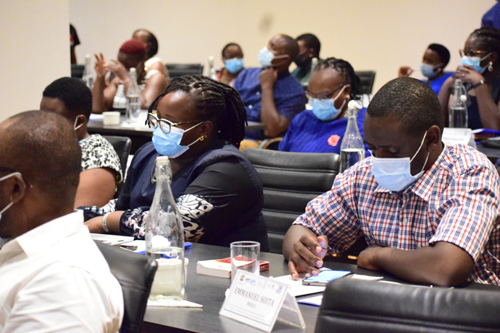
A section of the participants during the training. Held from March 9-12, 2021 at the Voyager Beach resort in Kenya’s premier coastal city of Mombasa, was this year’s Judicial Education on Environment and Land for Magistrates which was organized by the Judiciary Training Institute (JTI) and ANAW, with the support of United Nations Department Organization for Drugs and Crime (UNODC), Katiba Institute, International Consortium on Combating Wildlife Crime (ICCWC), National Environment Management Authority (NEMA) and Wildlife Direct. In attendance were 40 Magistrates, 5 Environment and Land Court (ELC) Judges led by the principal judge of the ELC, 12 members from NEMA and 13 participants from the various partner organizations. The training was for capacity building for ELC magistrates with environmental jurisdiction. Mr. Josphat Ngonyo, ANAW’s Executive Director, gave opening remarks at the continuous Judicial Education on Environment and Land for Magistrates Training. Mr. Ngonyo in his remarks highlighted the myriad of environmental challenges like the continued deforestation of Kenya’s primary forests, leading to the damage of critical habitats and water catchment areas. He also reiterated on the critical role played by the environment and land court in promoting responsible and credible land and environmental conservation opportunities for all stakeholders and assured that ANAW and the larger civil society sector would continue to support and contribute meaningfully towards capacity building of judicial officers under the guidance of the Judicial Training Institute (JTI), relevant to social, economic and environmental justice in Kenya and to be a role model for other African nations keen on involving different stakeholders on land and environmental matters. The training which cut across discussions on environmental protection and major procedures in the environment and land courts provided key insights on emerging issues on environmental crime and the reshaping of application of land laws, eviction laws incognizant of the common challenges faced in adjudication of environmental matters. Freeing Wildlife from Pain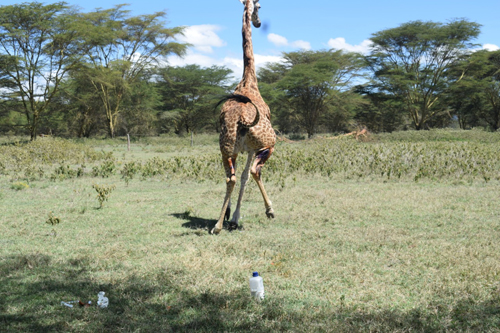
A treated giraffe leaps back to its habitat. . Partnering with the Kenya Wildlife Service (KWS) and other stakeholders in the provision of emergency rescue services to injured and distressed animals, the ANAW rescue team in collaboration with the KWS Veterinary Unit responded to wildlife in distress at three different ranches in Nakuru County. Two giraffes and three zebras in pain were attended to and given another chance to live. One of the giraffes was a female adult with a tight snare on the lower left hind foot at Kedong ranch. The giraffe was darted and brought down by trapping with a rope. The snare was removed, and animal medicated before being released to rejoin her herd. The second was a female giraffe with a deep wound on the upper section of rear right foot. The giraffe was darted, immobilized, wound cleaned and treated before the animal was released to rejoin her fold. The three zebras had wire snares and were attended to and given another chance to live. Consequently, 43 wire snares were lifted in Machakos County ranches – Maanzoni and Kwa Kyelu ranches. These could have killed unsuspecting wildlife, almost as many as twice that number. Glimmer of Hope Kasighau Guardians Intensify Their Patrols Amid Rising Human-Wildlife Conflict Cases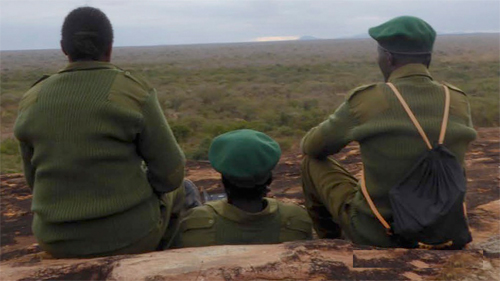
Kasigau Guardians on patrol at a look out point. The ANAW-supported wildlife guardians conducted 64 patrols within the expansive community ranch in the months of March and April, to protect Kasighau’s wildlife. In the month of April alone, the guardians noted increased incidences of human-wildlife conflict as they received intelligence report of herdsmen inside the ranch complaining about a cheetah that had been attacking their goats for a week. The incident was reported to the Kenya Wildlife Service (KWS) who captured one male cheetah on April 28, 2021. Similarly, a cow was killed by a lion in Katana area in the month of March. Arising from the reported escalating human-wildlife conflict cases, ANAW will be seeking to help equip the guardians with strong spotlights, solar charger and sounding horns or thunder flash to drive the animals away from human. Capacity Building on Donkey Owning Communities and Grassroot Government Authorities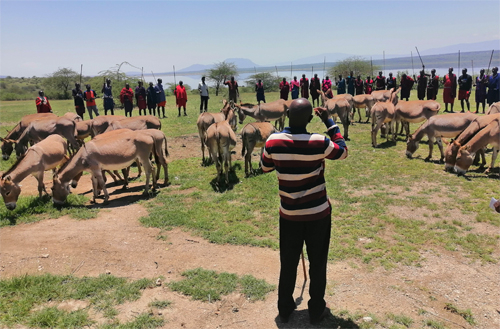
Chief Daniel Lonkoi addressing Donkey Owners During Donkey Celebrations in Mtaru, Magadi On March 31, 2021, ANAW officially closed the joint one-year project supported by The Brooke East Africa with a focus on building resilience and capacity of donkey owning communities and grass-root government officials for increased vigilance on donkey movement along the Kenya-Tanzania border to curtail illegal movement and rampant theft. A new phase of the project has commenced in April 2021 and runs up to March 31, 2022, with a similar focus and objective and as an augmentation of the previous project. Moyale Women: 'Donkeys Are Our Comfort'.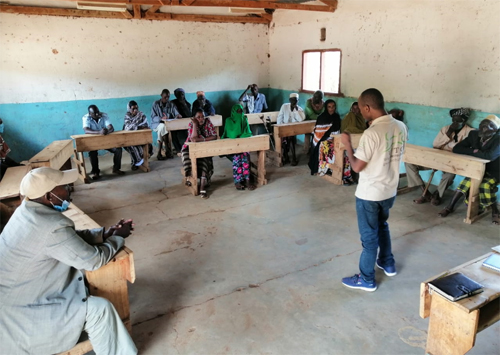
Dr. Dennis Bahati, (ANAW) leads a Focus Group Discussion (FGD) on cross-border movement of donkeys in Bori, Moyale Sub-county in Marsabit County. The implementation of the Welttierschutzgesellschaft e.V. (WTG) supported project that aims to address cross-border movement of donkeys across the East African borders focusing on Kenya-Ethiopia and Kenya-Tanzania border towns of Marsabit and Migori Counties has continued to take shape. In the month of April, five Focus Group Discussions (FGDs) with border communities were conducted within key border villages where donkey movement was common - Godoma, Bori, Golbo, Lami and Heilu. Vitally, it was noted that the women bore the biggest burden when their donkeys were stolen. Community members expressed the crucial role the donkey plays in safeguarding their livelihoods. Key functions undertaken by the donkey include fetching water, carrying farm produce, charcoal, firewood, among other uses. Indeed, the women referred to the donkey as ‘dhahabu gorille’ meaning ‘the donkey is my comfort.’ Moreover, during a 5-day market verification exercise, Moyale and Sololo markets were identified as the two main livestock markets in Moyale sub-county drawing traders from both Kenya and Ethiopia. Most of the livestock sold traversed through unofficial border routes (Dhambi, Kuraha, Rako, Mutiti, Mudiambo, Sololo among others) and rarely used the official One Stop Border Post in Moyale town. The focus of the exercise was to ascertain the sale of donkeys within the target markets and for what purpose (domestic use or commercial purpose). A spot check of the donkeys in both markets ascertained that they were being used to ferry charcoal, farm produce, firewood, and petrol (gasoline) to the market. Jaldesa Malicha, a donkey owner from Bori could not hide her joy after the FGD session; in her not-so-well-spoken Swahili, she said to ANAW team, “I have learned the importance of protecting my donkeys. This is the first ever meeting I have attended to talk about donkey welfare.” Closing one of her eyes, she added, “The government of Kenya should ensure the donkey slaughterhouses are shut down for good. We do not want to lose our donkeys again through theft. I will keep my donkeys safe so that they are not stolen. They are my dhahabu gorille.” And with a finality, she opined, “I will only sell my donkeys when I have a need for money but will not sell them to support the donkey slaughter business.” Towards a Cage-Free Chicken Farming in Kenya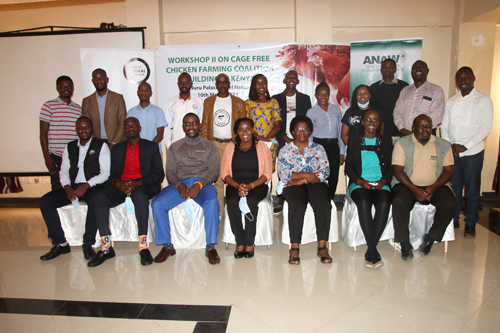
Participants during the cage-free workshop. The first phase of the Open Wing Alliance (OWA) supported ‘towards a free-cage poultry farming’ project ended in the month of March with a coalition forming workshop held at Nuru Palace Hotel, in Nakuru County on March 10, 2021. The aim of the workshop was to forge a cage-free farming coalition in Kenya. The workshop attracted a total of 20 participants from animal welfare NGO’s, and professional associations with interest in poultry farming and welfare namely World Animal Protection, Kenya Society for Protection and Care of Animals (KSPCA), Farm Animal Voice, The Brooke East Africa, Kenya Pig and Poultry Veterinary Association, World Organization for Animal Health (OIE) and Welttierschutzstiftung (WTS). The workshop which was a culmination of all the activities for phase one of the project provided a forum for experts’ presentations and guided group discussions on the best practices, structuring and composition of a coalition in Kenya. The workshop came up with recommendations and action plans for implementation towards the formation of the cage-free farming coalition. A working group was formed to streamline the recommendations and steer the coalition to lobby for cage-free farming in Kenya, with ANAW taking the secretariat role. The team also got a chance to meet with faculty members from the faculty of veterinary medicine and faculty of agriculture of Egerton University. The meeting was held virtually on March 11, 2021 via Zoom. The meeting had four representatives from ANAW and six representatives from the university. The meeting was to find out the faculties’ thoughts on battery cage farming and how they can work together to integrate animal welfare in the curriculum. The faculty members were very receptive to the idea of working together and suggested three areas that we can work together. The first was in capacity building - guest lectures or motivational talks for their students, student activities and sensitization campaigns for farmers and revising the curriculum to improve on animal welfare to include all species not just farm animals. The second phase of the project, which is a build-up of phase one, commenced in April 2021. Infant Sykes Monkey Rescued From A Dog Attack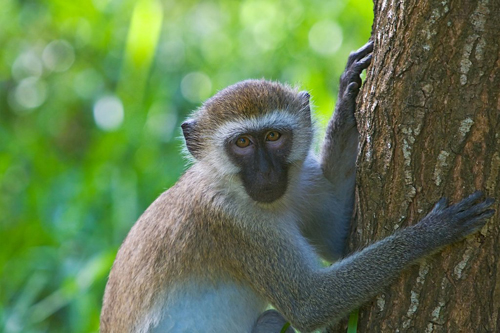
The months of March and April, Colobus Conservation – Primates Rescue and Rehabilitation Centre saw a total of over 31 welfare cases attended to. Out of the 31, 14 were Sykes, 1 Baboon, 7 Colobus and four vervets. Out of these, 8 came in dead, 4 were euthanized, 3 was admitted to the orphan care program. Good news; an infant Sykes monkey was rescued from a vicious dog attack, and she was then entered into the orphan care program, too. ANAW continues to support the important work of conserving the primates by providing a resident veterianary officer. ANAW Joins 19 Global Organizations to Launch the World Federation for Animals
A storm was felt online when animal welfare organizations across the globe announced the birth of the World Federation for Animals (WFA) on February 8, 2021. The organizations came together to launch WFA as an initiative that gives a voice to animals across the world and to achieve global impact. WFA works to create this impact through policy discussions that advocate for animals in global decision-making forums. “WFA is an incredible and profound initiative whose time has come. It is an initiative that is transformative in policy and practice, championing animal sentience and promoting a positive impact on the welfare of animals and people.” said ANAW’s Executive Director, Mr. Josphat Ngonyo. The membership organization was launched during the world’s largest assembly on environmental conservation, United Nations Environmental Assembly (UNEA). ANAW is happy to partner with the federation which seeks to influence international policy, provide information on animals in international policy, connect animal protection partners and ensure a strategic global approach. The founding members of WFA include Africa Network for Animal Welfare (ANAW), American Anti-Vivisection Society – USA, Animals Australia/International, Asia for Animals, Brooks Institute, The – USA, Compassion in World Farming, Deutscher Tierschutzbund – Germany, Djurens Ratt – Sweden, Dyrenes Beskyttelse – Denmark, Eurogroup for Animals, Fondation Birgitte Bardot – France, FOUR PAWS – International, GAIA – Belgium, Mercy for Animals – USA, RSPCA - UK/International, World Animal Net and World Animal Protection. You can learn more about this exciting new initiative here, www.wfa.org. The Practice of Animal Cruelty Discussed During Prime-Time in Nigeria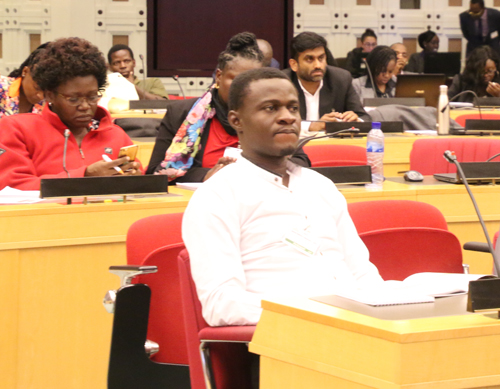
Chiemeka Chiedozie, during a past conference. Nigeria has taken steps to protect and care for the animals within its borders by establishing prohibitions regarding animal cruelty in the Nigerian Criminal Code, Cruelty to animals (Part.7, Chap.50). A major move was made when the Nigerian Animal Welfare Strategy was produced in 2016. It is these pointers that Chiemeka Chiedozie, founder and CEO of Humane Global Network Africa and Africa Network for Animal Welfare (ANAW)’s partner, raised during an interview discussing Plants, Animals and Ecosystems at Galaxy TV on April 25, 2021. He was quick to explain that although this is a win for the continent, challenges are still faced as the enactment and implementation of the laws are lacking to a great degree. Mr. Chiedozie argued that there are indeed laws in Nigeria that cater to the welfare of animals, but they are not implemented. In a society where consumption of wild and domestic meat is the norm, it is difficult to discourage the concept of illegal killing of animals. Bold arguments were put forward by Mr. Chiedozie in contrasting the well-entrenched practice and explaining the importance of animals to the society in the public space. A common question was placed to Mr. Chiedozie, one that many animal welfare enthusiasts receive often, on how essential animals are in this part of the world where animals are only seen as food and objects to serve the human well-being. Animal abuse is not understood or asserted as a challenge in the society. Mr. Chiedozie took the audience through animal cruelty as a vice by highlighting ways that people abuse animals through starvation, maltreatment, and neglect. He stated that the government is a good agent to help stop the abuse of animals in Nigeria. The government should play a mediatory role by creating awareness and should ensure that laws are implemented. He felt that the government should implement the law and see that those who abuse animal are caught, arrested, or forced to pay a hefty fine. Nigerians need awareness and should be taught to show kindness and compassion to other animals. The interview went on to deliberate on the connection between environmental degradation and climate change, the role animals play in a balanced ecosystem, animal welfare policy in Nigeria, insecurity, and agriculture. Mr. Chiedozie emphasized that animals are part of the ecosystem and should be cared for even in a society where animal abuse is a concept that is not understood. The interview gave insight to the great gap that Nigeria has in ingraining animal welfare concepts in everyday living. We congratulate Mr. Chiemeka Chiedozie for the wonderful work he is doing. Please watch the interview on https://www.youtube.com/watch?v=ctiixU7yUDQ Support Our Work Here's a great way to support Africa Network for Animal Welfare (ANAW) and enable us to protect future generations of animals. You can do so through the following ways: Leave a Legacy in Your Will Through Donation Visit the https://www.anaw.org website for more information. |

